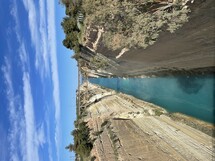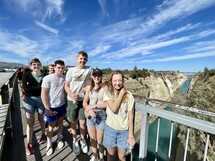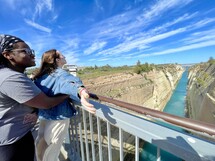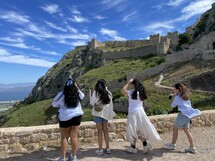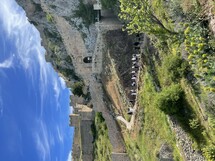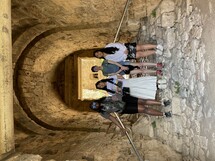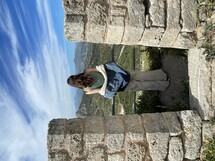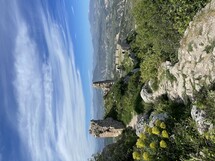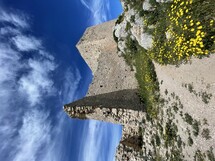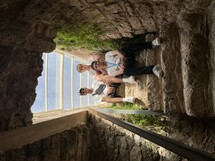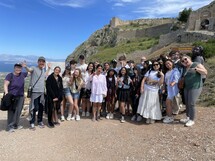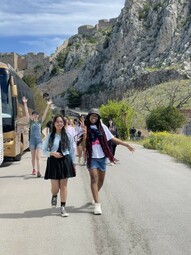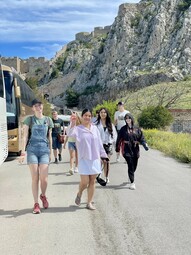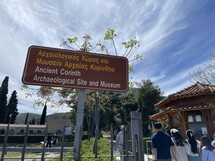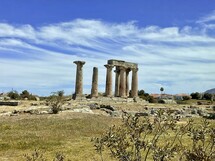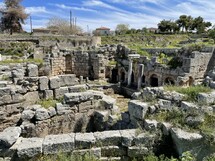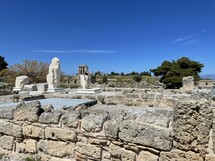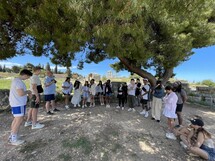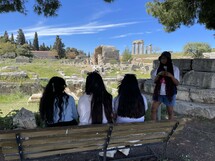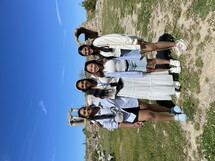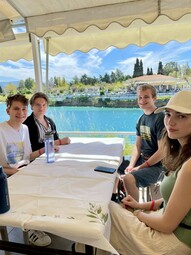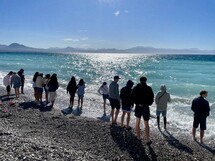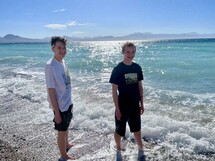Day 4: Acrocorinth and Corinth
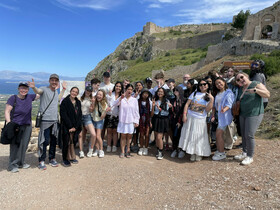
We board the bus at 9:00AM for our two hour drive to Corinth from Athens. We read the comments from our last blog post to the students and pray that our slower pace today would be an opportunity to be aware of God’s presence with us and learn whatever it is He has to teach us.
Our first stop in Corinth is the Corinth Canal, a 4 mile long, 80 ft wide canal cut through the earth at the end of the 19th century. The wind is strong as we walk out onto the bridge to see the vibrant teal, Aegean blue color of the water enclosed by the sharp walls of the canal, almost at 90 degrees. Landon remarks that he “has never been so aware of what is in his pockets”; it is a long way down. Imonitie and Aimee fittingly reenact the famous Titanic moment. This canal was a dream of the ancients, as it would create an important shipping route but by the time it was realized in the 19th century, it was much less essential. Today, it is not used for commercial shipping whatsoever.
As we continue our drive, Elie teaches us that the Romans conquered and destroyed the Greek city of Corinth in 146 BC. In 44 BC Julius Caesar rebuilt and re-established Corinth as a Roman colony. The City of Corinth in Paul’s time was the Las Vegas of ancient times. Men away on the seas would arrive in Corinth looking for entertainment. Arcocorinth, the highest point in Corinth, has the ruins of the fortress, overlooks the archeological Corinth, and is where Aphrodite’s Temple once stood. This temple enforced a practice called “sacred prostitution”; slave women were dedicated to the goddess of love, Aphrodite (Venus) and forced into prostitution. The money they made was then taken by the temple. Today, the official term in Greek for prostitution means “sacred slave”. This was an important reminder that when these ancient cities practiced idolatry, it didn’t just mean they believed in other gods; it meant that they had practices that often enslaved, oppressed, and exploited people in the name of their gods.
Despite its bleak history, Acrocorinth is a breathtaking place, with the Agean Sea at the base and the ruins of numerous buildings and towers at staggering heights up the mountain face. And something amazing: almost no one but our group is here. Imonitie and Ava remarked that it was much more immersive to explore because there were no people. Another student states that this reminds them of Lord of the Rings. Milette mentions that this would be the perfect place to film their Macbeth film adaptation project (a project they will have to catch up on when they return to school for English class!)
As we climb higher and higher, numerous students joke about the uphill hike with comments like: “my gluteus maximus is maximally on fire”, “my lungs are not good”, “I was going to conquer this hill, but nah, it was never that serious”. However everyone makes it up to the first ruins and spends time exploring the mountain. Joel, Sammy and Arie go all the way to the very top of the highest building on the tallest peak they can find.
Next, we board the bus again and drive down the mountain to the archeological site of Corinth below. This was a very special time for many students. The temple of Apollo stands in the backdrop of the bema, a platform where Paul was questioned and put on trial by the Roman official, Gallio, for conducting illegal teachings. Remember, Paul was a Roman citizen. Gallio refused to judge Paul based on a mere religious dispute amongst the Jews. Because of the monument’s connection to Saint Paul, the Bema was transformed into a Chrsitrian church during the Byzantine period.
We sit underneath the shade of a large, leafy tree as Pastor Grover preaches a message. What is our identity often found in? The students respond: in what we do. Pastor Grover reads from 1st Corinthians 1:26-31.
“Brothers and sisters, think of what you were when you were called. Not many of you were wise by human standards; not many were influential; not many were of noble birth. But God chose the foolish things of the world to shame the wise; God chose the weak things of the world to shame the strong. God chose the lowly things of this world and the despised things—and the things that are not—to nullify the things that are, so that no one may boast before him. It is because of him that you are in Christ Jesus, who has become for us wisdom from God—that is, our righteousness, holiness and redemption. Therefore, as it is written: “Let the one who boasts boast in the Lord.”
So our identity should not be rooted in what we do, or what we can boast in, or in what we accomplish, but in who we are in Christ.
Corinth is like our world and culture. Just like in Corinth, Jesus and our culture are always budding heads. Are we shaped more by our culture or by Jesus? The same God that transformed Paul and led him here to preach the gospel is transforming us today.
Students have time to explore the site, and Jeamor, Khariz, Bless, and Bella decide to sit on a bench to process and reflect on these ideas (while I eavesdrop). They discuss how if they had been Paul, they might have thought, “God, I dropped everything to follow you. Why are you putting these obstacles in my path?” And yet, Paul keeps going, strong in his faith and his mission to preach the gospel. He chooses his reaction to the situation, not becoming permanently discouraged, but in fact, joyful and he uses his time in prison as an opportunity to write letters to encourage other people of faith. And the same Jesus that encountered and sustained Paul in such a powerful way still encounters us today.
We head to our hotel in Corinth, before walking across the street to dip our toes in salt water of the Aegean Sea. We have all now put our feet in the Mediterranean! Students then enjoy some gelato while having some devotional time to process and reflect on their experiences. They use their Greece devotional books to guide their personal time before forming into groups and sharing highlights and learnings from the past few days.
We end the day we eating dinner at the hotel, staying late in the dining room to chat and laugh with friends, and heading to bed.
Comments
Hanford Deglint
PostedHi Ava!
Renae Warne
PostedYour blog posts are amazing Mrs. Cathcart! The description and pictures of your days are second best to actually being there! Thank you!
If I didn't know better, it almost sounds like Owen is living off gelato! Enjoy, enjoy, enjoy this trip!!!!!
Tony and Nicole
PostedThe write ups and photos are amazing!! Thank you so much for keeping us up to date with what the kids are doing. This is truly a trip of a lifetime.

